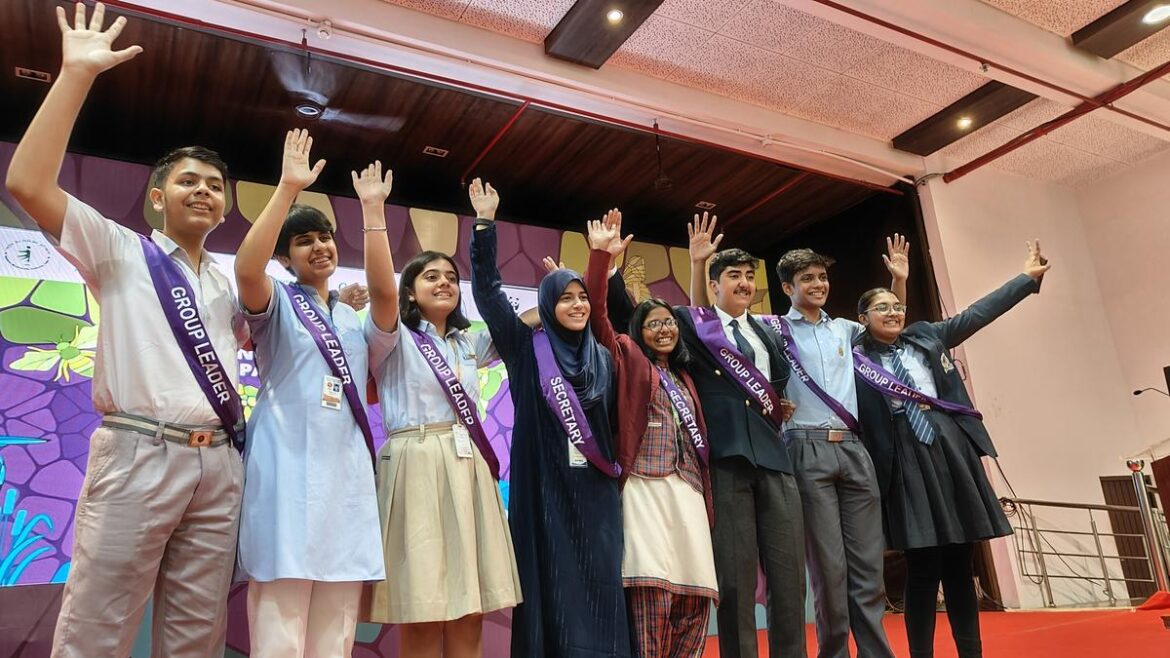Student delegates from across India at MCOP-5 discuss green solutions for the planet
The fifth edition of the Model Conference of Parties is aimed at empowering young environmental leaders for the future

Students from across the country assembled in Delhi to learn about environmental governance
| Photo Credit: SPECIAL ARRANGEMENT
Meghalaya is a treasure chest of natural resources. Chahat Kumari, a delegate from the state who was in Delhi to attend the Model Conference of Parties-5 (MCOP-5) with her teammates wished there was a process to identify Non-Timber Forest Products (NTFPs) such as bamboo and medicinal plants by using online resources. The team wished to study the impact of NTFPs on local communities because the students are keen on practicing fair trade for the forest.
Like the Meghalaya team, there were several other groups of students from different states pledging to devote themselves to their land and embark on a new journey to implementambitious action plans and skills.
Students from across the country were in the capital to actively engage in workshops and sessions at the Model Conference of Parties-5 Finale(MCOP-5) organised by the World Wide Fund for Nature-India (WWF). It was a five-day intensive program last weekend that turned out to be a transformative for 72 student delegates who gathered for the Generation 30-themed event to learn about better environmental governance and restoration of biodiversity by 2030.
Insightful workshops and interactive sessions by experts helped students develop SMART (Specific, Measurable, Achievable, Relevant, and Time-bound) action plans and Negotiation- Consensus Building, effective communication for conservation action, learning through nature exploration and Leadership for conservation action.
Dr Erach Barucha, a surgeon by profession and active in the filed of wildlife and nature conservation for more than five decades, inspired the students with his session on the common man’s guide to ecological restoration. “An environment leader without proper communication skills is incomplete and lacks the ability to negotiate in order to build a consensus on important issues of environment protection,” he told the gathering.
Neha Raghav, Director, of Environment Education (WFF India) highlighted the importance of the education programmes under WWF. “The aim is to spread awareness, bring citizens together and create opportunities for them to contribute to the cause of conservation. We wish to extend Model Conference of Parties to every state level so that students can tackle greater issues in future,” she said.
Akansha Mishra, a delegate from Meghalaya said she was inspired by what she learnt at the MCOP-5 and would go back to her home state and share her learnings with as many people so as to conserve the planet. “My most important takeaway is we breathe what we buy,” she said.
Ayaan Singh Bisht, another delegate fromHimachal Pradesh, said, , “The youth are crucial changemakers of a country. We should conduct more rallies and competitions to create awareness at the school level. It is everyone’s responsibility to protect the environment.”
Encouraging youth involvement in protecting biodiversity and climate change, Ziya Rouf, J&K, Secretary of the MCOP5 Student Council, said, , “Young people can drive change by adopting sustainable lifestyles, supporting eco-friendly businesses, and holding leaders accountable for their environmental commitments.”
Simran Jain, from Sparkly Mindz Global School, Karnataka said how community involvement is vital for biodiversity conservation at the local level. The MCOP student body reinforced the commitment of youth to implement their action plans at ground level effectively.
The WWF-India collaborated with environmental organisations – the National Biodiversity Authority of India (NBA), the Convention on Biological Diversity (CBD), the United Nations Environment Programme (UNEP), the IUCN Commission on Education and Communication (IUCN-CEC), United Nations Development Programme (UNDP), and Capgemini India, to equip student delegates with knowledge and skills necessary to build a sustainable future.
Prakriti Didwania
Read Comments
- Copy link
- Telegram
READ LATER
Remove
SEE ALL
PRINT
Related Topics
society
/
students
/
environmental issues

